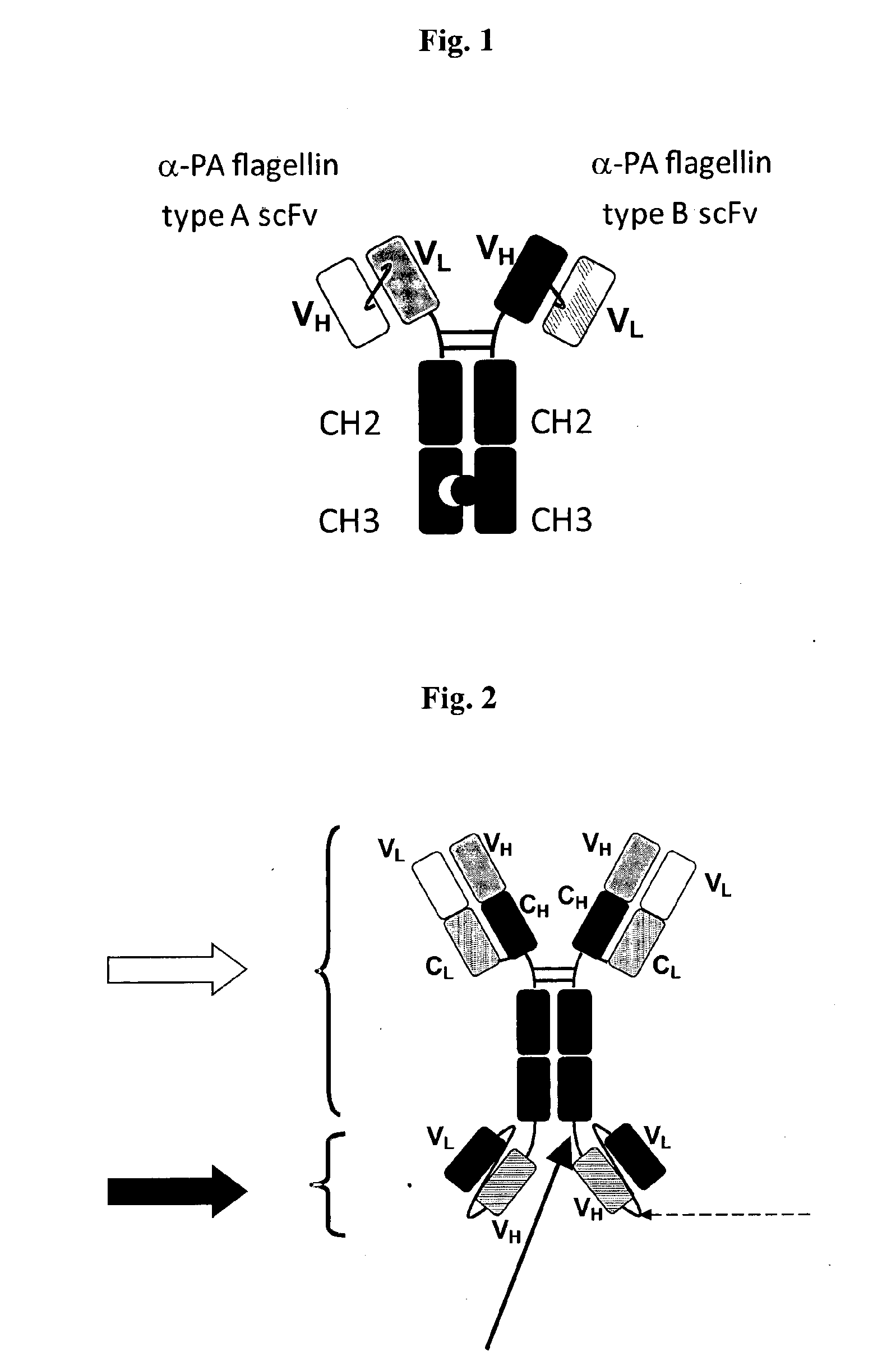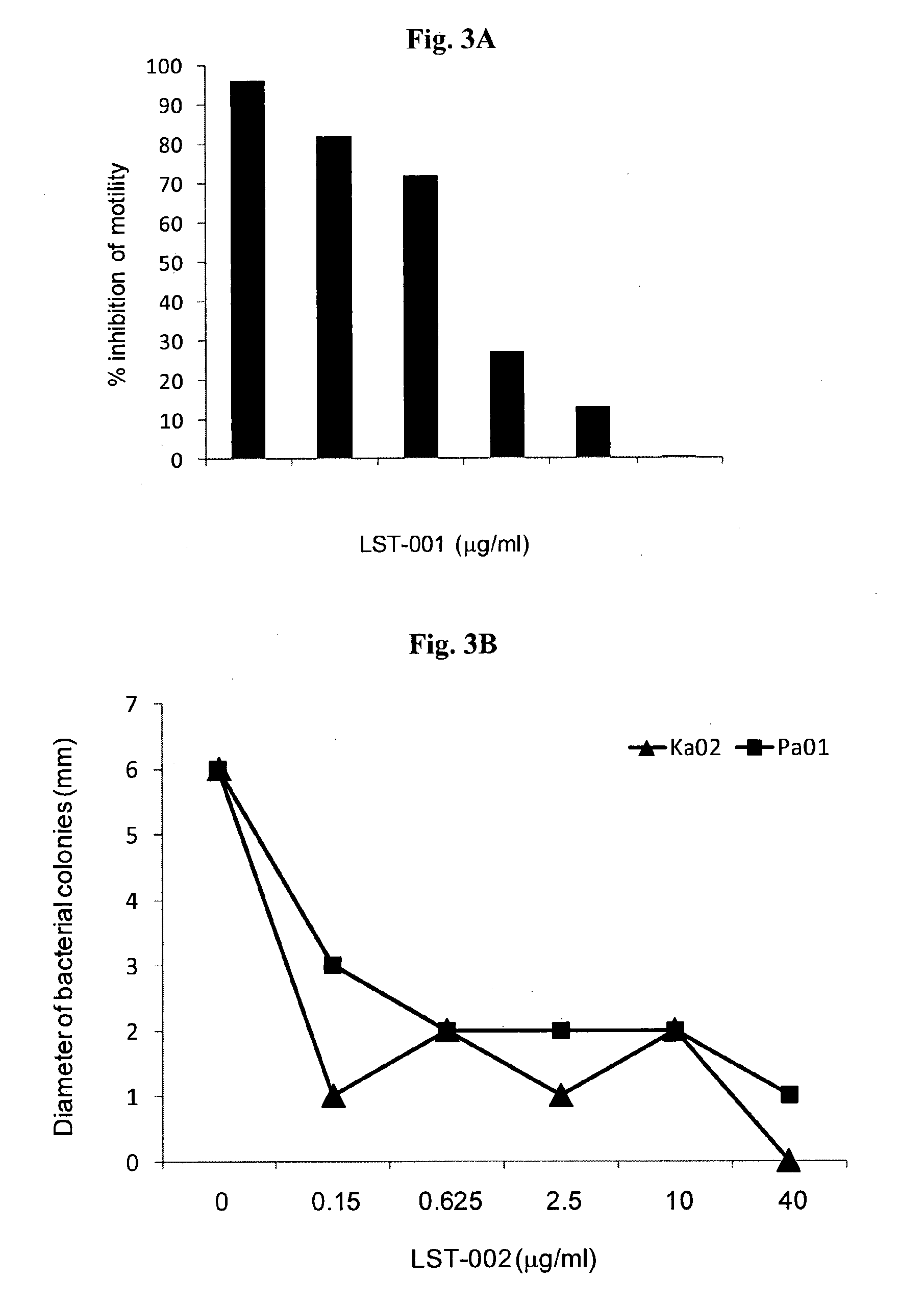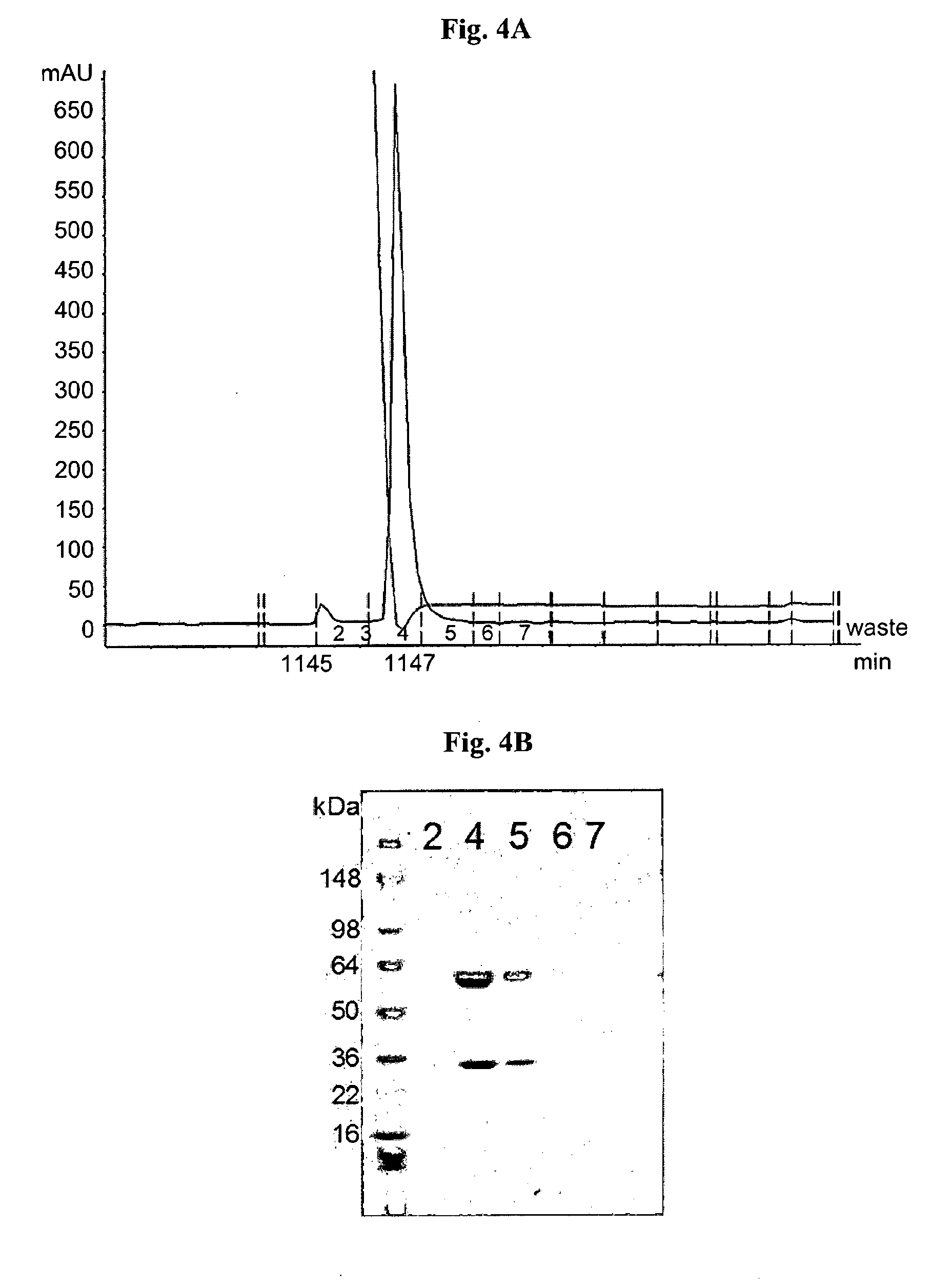Therapeutic antibodies against flagellated pseudomonas aeruginosa
a technology of flagellated pseudomonas and antibodies, applied in foreign genetic material cells, plant cells, sugar derivatives, etc., can solve the problems of multi-organ failure, sepsis, multi-organ failure and subsequent death of patients, particularly worrisome and difficult to treat, etc., to facilitate the detection of antibodies
- Summary
- Abstract
- Description
- Claims
- Application Information
AI Technical Summary
Benefits of technology
Problems solved by technology
Method used
Image
Examples
example 1
Sequencing the Variable Fragments of the Mouse LST-001 and LST-002 mAbs
[0117]The dideoxy termination methodology of polynucleotide sequencing of Sanger et al. (1977) was used to determine the sequences encoding the variable fragments of the heavy and light chains of the mouse LST-001 and LST-002 mAbs, and of the human LST-007. The sequences of the polypeptides are as follows:
(1) mAbs LST-001
[0118](1a) The full VH sequence (SEQ ID NO: 29)
[0119](1b) The mature VH sequence (SEQ ID NO: 17)
[0120](1c) The CDR sequences of the VH sequence as defined by IMGT / V-QUEST:
[0121]CDR1 (LST-001 VH) (SEQ ID NO: 19)
[0122]CDR2 (LST-001 VH) (SEQ ID NO: 20)
[0123]CDR3 (LST-001 VH) (SEQ ID NO: 21)
[0124](1d) The CDR sequences of the VH sequence as defined by Kabat:
[0125]CDR1 (LST-001 VH) (SEQ ID NO: 22)
[0126]CDR2 (LST-001 VH) (SEQ ID NO: 23)
[0127]CDR3 (LST-001 VH) (SEQ ID NO: 24)
[0128](1e) The full VL, sequence (SEQ ID NO: 30)
[0129](1f) The mature VL, sequence. (SEQ ID NO: 18)
[0130](1g) The CDR sequences of...
example 2
LST-001 Inhibits Motility of P. Aeruginosa Bearing Flagellin Type A but not P. Aeruginosa Bearing Flagellin Type B
[0170]A commercially available, P. aeruginosa strain derived from a blood culture (ATCC 27853) was grown overnight at 37° C. in LB media. This strain was shown by us to be a type A flagellin strain and is sensitive to all antibiotics. After overnight culture, bacteria were diluted in fresh LB media to generate an OD600 of ˜0.2.
[0171]To separate wells of 6-well sterile culture plate, a liquefied solution of 3 ml of soft motility agar (0.3%) was added containing LST-001 mAb (0.3-20 μg / ml) or a negative control LST-002 mAb (20 μg / ml). Thereafter, the mAb-impregnated agar was allowed to solidify for 2 hrs at room temperature after which time, 10 μl of bacterial suspension at OD600=0.2 was stabbed into the centre of the wells, at a depth of approximately ⅔ into the agar.
[0172]Plates were transferred to an incubator at 30° C. for 18-22 hr to allow bacterial growth and swarming...
example 3
Production of Chimeric Antibodies LST-003 and LST-004 Derived from the VH and VL Domains of their corresponding mouse monoclonal antibodies LST-001 and LST-002
[0177]Chimeric mAb LST-003, contains the LST-001 mouse VH and VL domains (SEQ ID NO: 29 and SEQ ID NO: 30, respectively) fused to its respective human IgG1 constant domains. The light chain of this chimeric antibody, consisting of the VL and CL domains, is encoded by the nucleic acid molecule having the nucleic acid sequence of SEQ ID NO: 70, and the heavy chain of this chimeric antibody, consisting of the VH and CH domains, is encoded by the nucleic acid molecule having the nucleic acid sequence of SEQ ID NO: 69.
[0178]In the same way, chimeric mAb LST-004, contains the LST-002 mouse VH and VL domains (SEQ ID NO: 49 and SEQ ID NO: 50) fused to a human IgG1 constant backbone. The light chain of this chimeric antibody, consisting of the VL and CL domains, is encoded by the nucleic acid molecule having the nucleic acid sequence o...
PUM
| Property | Measurement | Unit |
|---|---|---|
| Therapeutic | aaaaa | aaaaa |
| Antimicrobial properties | aaaaa | aaaaa |
| Light | aaaaa | aaaaa |
Abstract
Description
Claims
Application Information
 Login to View More
Login to View More - R&D
- Intellectual Property
- Life Sciences
- Materials
- Tech Scout
- Unparalleled Data Quality
- Higher Quality Content
- 60% Fewer Hallucinations
Browse by: Latest US Patents, China's latest patents, Technical Efficacy Thesaurus, Application Domain, Technology Topic, Popular Technical Reports.
© 2025 PatSnap. All rights reserved.Legal|Privacy policy|Modern Slavery Act Transparency Statement|Sitemap|About US| Contact US: help@patsnap.com



